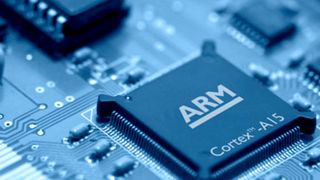Nvidia will have to back words with actions to satisfy Arm takeover concerns
Nvidia is saying the right things but industry, regulators and possibly the UK government stand in the way

It is difficult to recall many other deals in the technology industry that have caused such a rich tapestry of narratives and controversies as Nvidia’s proposed $40 billion takeover of Arm.
Even when Nvidia’s interest was only speculative, it was clear that there would be at least three major storylines that would have be resolved before any transaction could be completed.
Will the deal threaten Arm’s business model? Will American ownership jeopardise Chinese businesses access to Arm technologies? Will Britain lose jobs and control in one of the only areas of technology it has any meaningful influence in?
Now that a deal has been agreed, there will need to be some answers.
- Arm sacks Arm China boss
- Nvidia agrees $40bn takeover of Arm
- New Arm chip could give your SSD superpowers
Continued independence
Naturally, the answer that Nvidia gives to the aforementioned questions is ‘no’.
Nvidia is saying the right things and it will have expected the potential backlash. The deal has huge implications for the industry and could become politically explosive. Gaining all the required approvals could take significant time and effort and even then, some might feel the real value of Arm could be diluted.
Regulators and industry will unlikely be satisfied with just words. Legal assurances and guarantees will be the minimum requirement for many dissenters, while others will hope the deal does not go ahead at all.
Are you a pro? Subscribe to our newsletter
Sign up to the TechRadar Pro newsletter to get all the top news, opinion, features and guidance your business needs to succeed!
From an industry point of view, this deal could change everything. Arm’s business model is based on neutrality as it licences its chip designs to anyone who wants them, including Apple, Qualcomm and Huawei. This has proved a highly successful approach and one that has granted the company considerable influence in the industry.
The fear is that this independence would be fatally undermined if one chipmaker could, in theory, adjust technical roadmaps to suit itself at the detriment of others.
Nvidia emphatically denies this would be the case, promising that Arm would be free to do as it pleases. It says Arm’s value is in its independence and that the real value of the combination is the fusion of its chip designs with Nvidia’s expertise in artificial intelligence (AI).
“We will maintain Arm’s licensing model and customer neutrality,” said Huang. “That’s essential to Arm’s success.”
“That independence has been part of our strength,” agreed Simon Segars, Arm CEO. “We might have a different parent company, but the intention is to continue to operator that with independence. We don’t see that changing.”
However, there are already reports that some vendors are concerned and Nvidia’s ownership could act as a catalyst for alternatives, such as open source RISC-V. The development of a rival architecutre would be an admittedly complicated and long-term project but it could ultimately affect Arm’s revenues if there is enough momentum.
“The value of Arm’s independence is such that an acquisition by Nvidia would be likely to erode Arm’s value,” Geoff Blaber, an analyst with CCS Insight. “If its partners believed that Arm’s integrity and independence was compromised, it would accelerate the growth of RISC-V and in the process devalue Arm.
“RISC-V is poised for rapid growth and poses a competitive threat. A long line of Arm licensees are also part of the RISC-V community and steadily upping their investment. There’s a scenario in which Nvidia pays a rich premium for Arm, the very act of which sparks an erosion in its value as focus shifts to a more independent alternative.”

Chinese approval
The dependency on Arm’s technology is such that if Nvidia is unable to convince partners and authorities of continued independence, then it will be difficult to obtain all the required regulatory approval it requires to proceed. This includes China, which presents another complication.
Authorities there might not be inclined to hand over control over such an important part of the technology ecosystem over to American owners at a time when the country’s relations with the US are increasingly fraught.
This is in no small part down to sanctions on Chinese technology firms that restrict access to US innovations and markets. The concern here is that Arm’s chip designs could be subject to these sanctions.
Not only would this be a headache for Chinese partners, it would also deny Arm considerable revenues, decreasing its value further. It’s worth noting that many Chinese firms are members of the RISC-V Foundation.
In any case, China might demand concessions in exchange for approval.
Nvidia refutes these fears on the grounds that Arm’s research and development is done in the UK – not the US – and that Nvidia has no intention of changing that.
“Nothing changes in this transaction with regards to the jurisdiction of the technology,” said Huang. “The technology is from the UK, Arm is based in the UK, and the work will be done in the UK.”
Technological sovereignty
This leads us on neatly to the final complication at play – the UK government. Softbank’s $32 billion takeover of Arm in 2016 was lamented by many within the British technology industry who felt the country’s best chance of creating a homegrown international tech giant had been lost.
However, the blow was softened by legally binding commitments from Softbank to not only keep research and development in Cambridge but also to expand its workforce. These promises have been kept.
Nvidia is pitching its acquisition as an opportunity to grow Arm as a company, deliver benefits for the entire mobile and IT industries, and enhance the UK’s credentials as a leader in Artificial Intelligence (AI).
“There has been considerable media speculation about what this [transaction] might mean for ARM and for the UK,” Huang said. “We want to grow ARM and make it even better… ARM will remain based in the UK.”
Central to this vision is the establishment of a ‘world-leading’ AI laboratory in Cambridge. This facility would house one of Europe’s most powerful supercomputers and would attract the best computer scientists in the world. British researchers would no longer have to leave the country to advance their careers.
Nvidia is not bound by any formal agreements but said it is open to talking to the UK government about concrete pledges on jobs and investment. Until there is something in writing, Nvidia can expect scrutiny.

Does Arm need 'saving'?
One of the most vocal critics of the deal has been Herman Hauser, one of Arm’s co-founders. He is inviting anyone to sign an open letter to the Prime Minister Boris Johnson, calling on him to impose conditions on any sale.
Hauser is concerned that a move to the US would impact British jobs and that the chipmaker would “destroy the very basis of Arm’s business model which is to be the Switzerland of the semiconductor industry dealing in an even-handed way with its over 500 licensees. Most of them are Nvidia’s competitors. Among them are many UK companies.”
He also calls the matter an issue of economic sovereignty, arguing that a takeover would see Britain lose a key instrument of soft power in the middle of an ongoing technology war between the US and China. He says Johnson should seek legally-binding job guarantees, assurances that Nvidia would not receive preferential treatment, and that Arm designs are exempt from certain US regulations.
Failing that, he is proposing that Arm once again becomes a publicly traded company, with the UK taking a significant stake.
“As you have spent £500m to help OneWeb out of Chapter 11, which arguably is not as important to Britain as Arm, you could spend £1-2bn as the anchor investor for an IPO on the London Stock Exchange. An IPO was always the declared route to liquidity for Softbank,” he said.
“If you do not act on this transaction in the national interest, history will remember you not as the person who took Britain out of Europe but the person who delivered Britain into American vassalage.”
For all the AI technology at its disposal, Nvidia would not have needed an algorithm to predict the issues that have been raised. But it might need a supercomputer to figure out how to get this deal across the line.
- These are the best 5G phones you can currently buy
Steve McCaskill is TechRadar Pro's resident mobile industry expert, covering all aspects of the UK and global news, from operators to service providers and everything in between. He is a former editor of Silicon UK and journalist with over a decade's experience in the technology industry, writing about technology, in particular, telecoms, mobile and sports tech, sports, video games and media.
